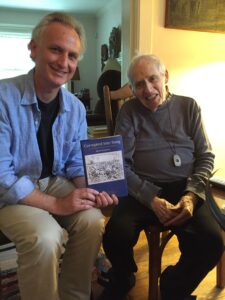The Complete Poems of Alvin Feinman
Alvin Feinman (1929-2008) was my poetry teacher at Bennington College in the 1980s. He made a huge impression on me as a teacher, with the purity and integrity of his engagement with poetry, and I consider his poems to be among the greatest written by an American in the 20th century, rivaling the work of Hart Crane and Wallace Stevens, with whom his poetry and poetics have so much in common. I collaborated with the late Deborah Dorfman, Alvin’s widow, Harold Bloom, Alvin’s close friend from their grad school days at Yale, and Alvin’s former student and colleague Vivian Heller to bring out Corrupted into Song: The Complete Poems of Alvin Feinman, just published by Princeton University Press. Harold Bloom wrote a preface for the book, and I wrote a biographical/critical introduction.
Alvin only published twice: his debut, Preambles, in 1964, and a reissue of that book, Poems, which contained a handful of additional poems, in 1990. When Alvin died in 2008, he left behind a small cache of documents, about 200 manuscript pages. Deborah had been transcribing and editing this manuscript for several years by the time I contacted her in the summer of 2014. The manuscript contained dozens of poetic fragments and 47 unpublished poems. Deborah and I decided to put together a complete edition of Alvin’s poetry—the text of the 1990 edition of Poems plus 39 of the unpublished poems.
Alvin’s writing demands a thoughtful approach, Elizabeth Lund wrote in her review in The Washington Post, “the speaker doesn’t just describe a moment, he tries to re-create it, as in the lovely poem “Waters,” in which he notices “Sunlight stitching the water —/ an oar silverly lifted./ And blue, and yellow, and red boats drift —/ like pleasures in a mind that needs no center.” These poems do have a strong center, which springs from the speaker’s intelligence, his measured rhythms and use of rhyme, and his sometimes detached outlook as he examines the world around him and always knows that “Something, something, the heart here/Misses.” Light is a recurring theme, and shapes the gorgeous “Stills: From a 30th Summer,” one of many poems that show why Feinman’s work deserves a broader audience.”
Here is a small, lovely poem from the book:
Song of the Dusting Woman in the Library
What is it holds the scholar to his desk
These nameless days, and through the long
Uncounted years? Is it the use of tears
He works to understand? Is it the song
He seeks that has not yet been sung?And will he sing then when the tome
Is shut, the last word’s echo in his brain?
And will he weep then when the last
Idea is hung, when he has wrung
The name, the origin, the issue of each pain?
According to Bloom, “The best of Alvin Feinman’s poetry is as good as anything by a twentieth-century American. His work achieves the greatness of the American sublime.” Yet, in part because he published so sparsely, Alvin remained little-read and largely unknown when he died.

In researching my introduction, I found a sheet of paper with a quote from Geoffrey Moore scribbled on it in one of Alvin’s copies of Preambles. Alvin wrote “of W.S.” (perhaps William Shakespeare) at the top of the quote, which reads: “One has a sense while reading him that creation is proceeding before one’s eyes. The whole is a continuous process, not a ‘talking about’ … so that, one receives through the aesthetic sense an impression of pure potency.”
Alvin’s poems convey the same sense Moore describes of creation taking place before one’s very ears and eyes. His poems recount intense emotional, intellectual, even spiritual experiences that catalyze similar experiences in the reader. “For a poet, it is never a matter of saying it is raining,” Paul Valéry wrote. “It’s a matter of . . . making rain.” The process is the poem, and vice versa. The great challenge and reward of Alvin’s poems is that in reading them one participates in their making.
Listen to Harold Bloom read “November Sunday Morning” and “Relic”, two of Alvin’s greatest poems.


